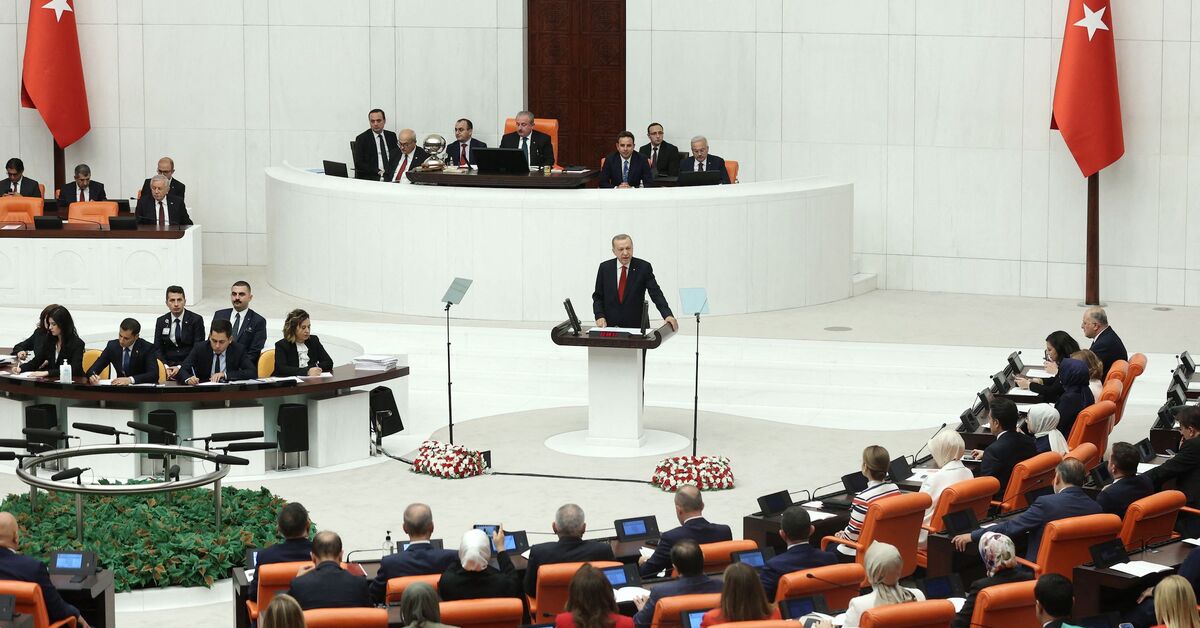Denouncing EU-NATO declaration, Turkey sets hurdle for cooperation
Geopolitical interests raised by Turkey over the divided island of Cyprus are threatening to become an issue for efforts to forge closer EU-NATO ties, a declared goal of both organisations.
NATO and the EU signed their third political declaration in January, vowing closer cooperation on issues related to Euro-Atlantic security.
Back then, they also expanded the list of areas for cooperation to “protection of critical infrastructures, emerging and disruptive technologies, space, the security implications of climate change, as well as foreign information manipulation and interference”.
Despite the apparent message of unity in the declaration, Ankara at the time communicated almost immediately it would not align with the document, several NATO diplomats told EURACTIV.
The opposition was largely motivated by political considerations over the Cyprus dispute, the diplomats said.
Cyprus was divided following a 1974 Turkish invasion, triggered by a brief Greek-inspired coup. The northern part remains under the control of the self-proclaimed government of the “Turkish Republic of Northern Cyprus”, which has not been officially recognised by the international community. The island nevertheless joined the EU in 2004.
Since peace talks started in September 2008, countless attempts to broker peace between the two sides have failed.
Since a failed summit in 2017, Greek and Turkish Cypriots have moved even farther apart, hampering cooperation in several important matters and increasing tensions in the Eastern Mediterranean.
Due to the frozen conflict, Ankara believes the declaration stating that both organisations “will take the NATO-EU partnership forward in close consultation and cooperation with all NATO allies and EU member states” goes against the interests of Turkey and of the Turkish community in Cyprus, EURACTIV understands.
Turkey did not respond to EURACTIV’s request for comment by the time of publication.
Roadmap delayed
While Ankara’s irritation so far had few practical implications, it could block progress on the EU-NATO Roadmap, which will list concrete and practical topics for cooperation between the EU and NATO and should have been agreed upon at the same time as the political declaration in January.
Everyone “understands the importance of strengthening the relationship, but it seems there is a problem,” two NATO diplomats said when asked about the state of the document.
“The EU has Cyprus, NATO has Turkey”, the diplomat said, pointing out that the issue came from both sides.
NATO Secretary-General Jens Stoltenberg said last December that the alliance strongly supports “the United Nations’ efforts to try to find a negotiated and peaceful solution. I think that’s the only way to address the challenges and unsolved issues in Cyprus”.
Currently, 22 NATO members are also EU member states, accounting for a third of the military alliance since Finland joined in April.
Sweden, which also applied for membership last spring and is awaiting a green light from Turkey, will bring the number to 23. Neutral EU countries Austria, Ireland, Malta, and Cyprus are not part of the military alliance.
NATO and the EU’s current cooperation roadmap dates back to 2018, when the military alliance did not have the rising China challenge on its radar and before the 2022 war in Ukraine.
With 74 proposals, the 2018 declaration focused on enhancing military mobility of troops and equipment across the territory, cyber security, hybrid threats, counter-terrorism, and including women in security matters.
In recent times, Turkey has also blocked the collaboration between the EU’s Operation Irini, controlling the Libyan arms and oil embargo, and NATO Operation Sea Guardian.
Claudia Graziano, the former chairman of the EU Military Committee, said at a security conference on the Mediterranean in 2021 that the EU should “try to overcome some of the current obstacles to our cooperation with NATO” and should not let “political issues” get in the way.
“A problem we might easily spot [is] in the Mediterranean Sea, between Operation Irini and Sea Guardian: in a perfect world, we would have had one single operation, but nowadays we could and should aim at an improved cooperation”, he added.
In July, European Commission President Ursula von der Leyen and European Council chief Charles Michel will be invited to participate in a working session with NATO member states at the military alliance’s Vilnius summit in a show of close partnership between the two and their members.
[Edited by Alexandra Brzozowski/Alice Taylor]




/cloudfront-us-east-2.images.arcpublishing.com/reuters/TIFTUJAIOZLWJMW67OWYNOZJ7Y.jpg)